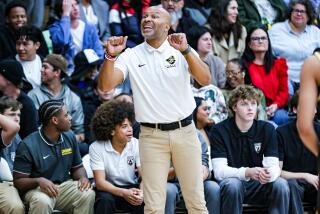‘90s FAMILY : How You Play the Game Some victory-obsessed parents can’t set aside their own sports dreams. But praise and approval will keep kids having fun.
- Share via
Some youth sports coaches require contracts of intent before the first practice begins. Others demand oaths to good sportsmanship before the season’s starting gun, kick-off, tip-off or first pitch.
No, this is not aimed at the kids. These are some of the tactics taken to get parents to support their children’s sports activities without resorting to childish behavior themselves.
Too often it’s adults who take the fun out of sports. Good “sport-parenting” is more than dropping kids off at practice on time and less than expecting an 8-year-old to be the next Michael Jordan or Monica Seles.
Experts say parents need to put their own hoop dreams aside and recognize the difference between encouragement and pressure.
“Children need to know their parent-child relationship is intact regardless of their sports performance,” says Jay Coakley, sports sociologist and director of the Center for the Study of Sports and Leisure at the University of Colorado in Colorado Springs.
“Children need to know they are valued as children, not players of sports,” he says.
Unfortunately, some of the nicest parents turn into ugly, victory-obsessed fans when they watch their children compete.
“The reality is that everyone likes to win. You have to tell parents to say nothing unless it’s encouragement,” says David Walker, a Calabasas businessman who coached his own sons in soccer and basketball for 10 years. “Scoring is its own reward. Parents need to remember the team effort and also compliment the players who helped to make the goal happen.”
Few adults realize the power behind their words and actions, says Vincent Fortanasce, a Pasadena neurologist, psychiatrist and veteran Little League coach whose book “Life Lessons From Little League: A Guide for Parents and Coaches” was published this year by Doubleday.
“If parents are smiling, children feel good about themselves. If they are angry, children see themselves as bad,” he says. “Children build self-acceptance initially when parents seek out the good in whatever they’re doing.
Pride in seeing her daughter’s positive self-image is what keeps Karen Norris of San Antonio, Tex., encouraging daughter, Sara, to stay in sports. At age 10, Sara has participated in swimming, basketball and baseball.
“It’s cool to see girls her age look at their bodies in a different way,” she says, “for their athletic ability, coordination and prowess as opposed to their thinness or how beautiful they look.”
Good or bad, sports memories are among our most vivid, says Steve Berkowitz, a Los Angeles sports psychologist and columnist who often interviews professional athletes about their childhood sports experiences.
“Many athletes who had angry parents say they’d never do that to their own children,” Berkowitz says. “Parents get so emotional because they identify with their children. They have a lot invested and are afraid of failure.”
So how can a parent be an advocate without being an annoyance?
Berkowitz suggests that before beginning any sport, parents sit down and talk to their child about the sport and why he or she wants to play it.
“Take the approach that you don’t fail at sports, you do the best you can and you leave it on the field,” he says.
The American Sport Education Program suggests in its book “SportParent” (Human Kinetics, 1994) that children should play a sport because they want to, not to make their parents happy.
According to the ASEP, 20 million children between the ages of 6 and 15 participate in organized sports outside of school each year. One third of those drop out. The ASEP identifies five reasons why:
* Conflicts with other interests.
* Lack of playing time.
* Lack of success.
* Lack of fun.
* Competitive stress.
Consider conflicting interests a given in any child’s life, says the ASEP. For most kids, the other four reasons are interrelated.
“Athletics is nothing but a game,” says Mike Benedict, a Sugarland, Tex., assistant principal who has coached basketball for 18 years and has three sons who play extracurricular sports. “You play the game to have fun. If you can’t have fun, why should you play? It’s the coaches’ responsibility to get all the kids involved and make it fun.”
Parents need to learn about the sports organization before their child starts to play. Walker suggests parents look at the attitude the program is projecting. Many have rules about rotating positions and equal playing time. Leagues that allow drafting are likely to be more competitive.
“The coaches should have a parents’ meeting. Ask the coach if there are one or two star players. That may affect the playing time of the other players. What kind of attitude does the coach have? Is winning the only goal? This may be your only chance to back out gracefully and without emotional distress to your child if you don’t like what you see,” Walker says.
A touchstone for kids and parents alike is lack of playing time, says Benedict.
“Parents need to come in to get things off their chest and it usually has to do with playing time,” he says.
“My advice to parents is they need to look at what is good for the team and not just their child. Parents aren’t there at every practice seeing what their child is doing. If a kid wants to play badly enough, most coaches are going to respond to that. Tell your child to go talk to the coach himself first. Don’t fight their battles for them.”
Benedict finds another problem coaches face is parents who don’t know the rules of the game, leading to erroneous complaints.
In addition, “If you have a legitimate complaint, talk to the coach in private,” he says. “Nothing can embarrass a child more than when his parents make a scene.”
Parents who choose to coach their own children face a double-edged sword.
“The goal of a coach is to treat everyone fairly, and the goal of a parent is to give priority to your child,” says Coakley. “To manage those contradictory expectations is difficult, but not impossible.”
“Everyone looks for the coach to show favoritism, and you have to bend over backward to avoid that,” says Tom Beck, a Pasadena attorney and father of four who has coached several of his children’s teams.
Beck says the biggest advantage to coaching your own children is spending more time with them. He believes a healthy respect for a child’s wishes goes along with teaching good sportsmanship and improving skills. Before coaching his own children, Beck asks their permission.
“I can truly say I saw my kids grow up,” Walker says. “Every minute I spent [coaching] I benefited a lot. I’ve talked to them about my involvement and they say they were happy I was there. But there came a time when it was clear it was time for me to step aside. I saw other parents who continued coaching when their kids didn’t want them there.”
Walker sees the positive sense of athleticism his sons are taking to their adulthood. Like any adult who enjoys playing catch in the yard or a pickup game with his kids, he realizes the value in keeping the ball rolling.
“The experience may not culminate in a top-ranking high school athlete, but will surely produce self-esteem and other positive results,” he says.
(BEGIN TEXT OF INFOBOX / INFOGRAPHIC)
Ways to Keep the Ball Rolling Some tips to remember the next time you find yourself faced with a team sign-up sheet or sitting in the bleachers:
* Let your child try out many sports.
* Try to attend all your child’s sporting events.
* Encourage only; no negative comments.
* Know the rules of the game.
* Don’t expect adult thinking and physical skills from children.
* Steer clear of coaches with “winning at all costs” attitudes.
* Promote good sportsmanship.
* If you must complain to the coach, do it in private.
* Enjoy informal games with your family.
More to Read
Go beyond the scoreboard
Get the latest on L.A.'s teams in the daily Sports Report newsletter.
You may occasionally receive promotional content from the Los Angeles Times.










